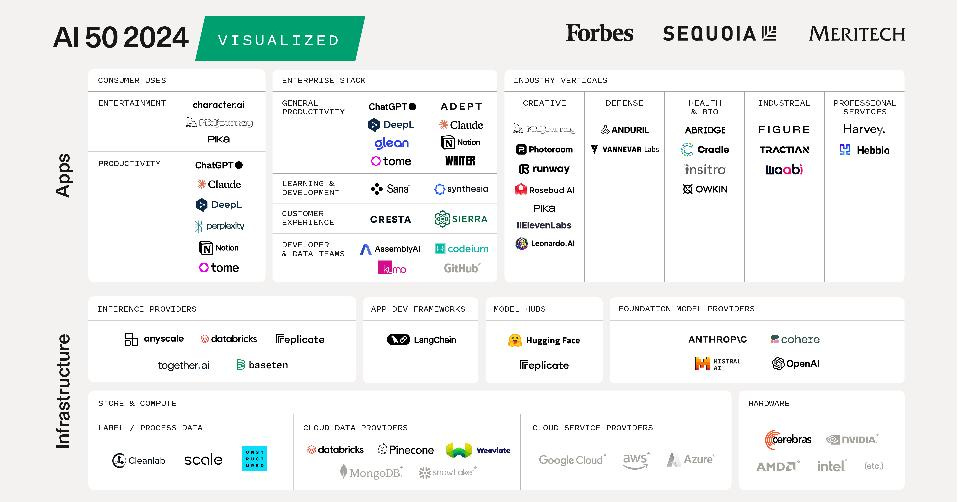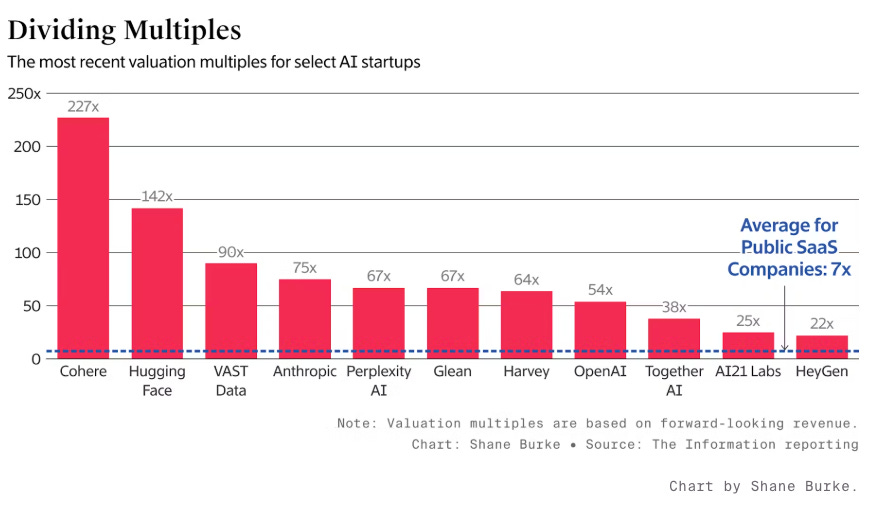Two years on from ChatGPT, AI valuations are still a murky business; Fortune reveals this year's AI innovators; the NBA steps up its social game with AI; Microsoft brings voice cloning to Teams
Niantic is building a large geospatial model; business spending on AI surged 5x this year; how Meta rebuilt itself around Llama; inside Amazon's efforts to revitalize Alexa
Every November, founders and VCs gather in Helsinki to ring out the old year at Slush which bills itself as "the most founder-focused event on Earth." The theme for this year is metamorphosis which comes from Greek and literally means "change of form."
There's been a lot of change in the world recently but nothing has come close to the AI gold rush started by ChatGPT two years ago.
For the first time in a long time, we've seen a new generation of companies and founders really challenging the Big Tech status quo, and with them promises of a revolutionary future. But along the way, we've also forgotten that most people struggle with change and that, when change happens too fast, we often can't discern what was once familiar to what's new.
Take valuations for example: traditionally, we used to measure companies by their multiple, calculated as the company's valuation divided by its revenue. Multiples used to be a safe metric for investors to compare a company to other businesses. For example, the price-to-earnings (P/E) multiple is still a common way to value the stock of listed companies.
But with the AI companies of today, using multiples is no longer an option because, for many of them, they create a distorted picture of their true worth. The reason is simple: many AI companies are now built on hype and raise enormous sums of capital early in their lifecycle, often before achieving meaningful revenue or product market fit. This leads to astronomical multiples, sometimes exceeding 100 or more.
Take xAI — the Wall Street Journal reported this week that it is raising $5 billion in a new funding round, valuing it at $50 billion with just $100 million in revenue. Based on these numbers, xAI would have a multiple of 500x. While this might sound exciting to some, it should raise red flags. High multiples signal either immense confidence in future growth or an overreliance on storytelling and speculative potential rather than substance.
Contrast this with AI companies that have focused on building robust products and generating stable revenue. These firms often have far more reasonable multiples (20 to 30x), reflective of solid fundamentals rather than hype.
The media has a role to play here for sure, as reporters shape how AI companies are perceived. Startups often thrive — or falter — based on the stories told about them. A glowing profile in a major outlet can fuel additional fundraising, partnerships, and customer interest.
When the media fails to scrutinize the actual business performance of AI companies, we get into a vicious cycle:
First, hype-driven companies attract more capital. Then, that capital inflates their valuations, leading to even higher multiples. Finally, the inflated valuation is then reported as a sign of success, further driving interest. We can see this playing out in the US, where startups have raised 3x the amount of European VC overall in 2024, but 5x the level of AI investment. Even in a good year, with megarounds for Wayve, Helsing, Mistral, and DeepL, Europe trails by a distance.
Meanwhile, companies with real, proven products can struggle to break through the noise. Without the inflated valuations to grab headlines, their genuine achievements are often overlooked.
The AI industry isn't the first to face this problem. During the dot-com boom of the late 1990s, countless internet companies achieved sky-high valuations based on little more than the promise of future growth. When the bubble burst, only a fraction of those companies survived. Those that did — like Amazon or Google — were rooted in real business fundamentals. The main difference between the dot-com years and today's AI era is just how capital intensive the startups are. If you're building foundation models, you need hundreds of millions of dollars just to play catchup with OpenAI's technology.
We should celebrate founders for sure and acknowledge the transformative potential of AI, but we should also be clear that not every company will succeed. And the ones that do are more likely to have good answers to the following four questions:
One, let's start with revenue growth: Is the company generating significant and growing revenue from a diversified customer base?
Second up is customer adoption: Are real businesses or consumers paying for the product, and are they renewing?
The third one is about operational metrics: How efficient is the company in scaling its operations? What's its path to profitability?
And the fourth is technological differentiation: Does the company have a genuine technological advantage, or is it repackaging existing capabilities?
By adapting the way we use metrics in tune with the times we're living in, we can better navigate the next waves of change that are about to come.
And now, here are the week's headlines:
❤️Computer loves
Our top news picks for the week - your essential reading from the world of AI
Index Ventures: Scaling Through Chaos in the Age of AI
Inc: The NBA Stepped Up Its Social Media Game With AI. So Can You
AP: Nvidia rivals focus on building a different kind of chip to power AI products
Fortune: AI enters a new phase, and the Fortune 50 AI Innovators list identifies the companies leading it
TechCrunch: Current AI scaling laws are showing diminishing returns, forcing AI labs to change course
The Verge: Niantic is building a ‘geospatial’ AI model based on Pokémon Go player data
CNBC: Business spending on AI surged 500% this year to $13.8 billion, says Menlo Ventures
WSJ: It Isn’t Just Data Centers—AI’s Plumbing Needs an Upgrade
Washington Post: Want to speak Italian? Microsoft AI can make it sound like you do.
The Information: OpenAI’s Female Staff Complain of Gender Disparity After Murati Exit
Fortune: How Mark Zuckerberg has fully rebuilt Meta around Llama
Business Insider: Inside Amazon's agonizing attempt to save Alexa with AI
WSJ: AI Investments Are Booming, but Venture-Firm Profits Are at a Historic Low
Business Insider: OpenAI ranks fourth among top tech vendors that IT leaders plan to spend the most with, survey finds
The Guardian: ‘Have your bot speak to my bot’: can AI productivity apps turbocharge my life?
The Economist: Will the bubble burst for AI in 2025, or will it start to deliver?
FT: Tech investor Xavier Niel urges Europe’s AI start-ups not to cash out
⚙️Computer does
AI in the wild: how artificial intelligence is used across industry, from the internet, social media, and retail to transportation, healthcare, banking, and more
TechCrunch: YouTube Shorts’ Dream Screen feature can now generate AI video backgrounds
Business Insider: AI is helping one software security company send 5 times the number of threat alerts in record time
The Verge: Messenger video calls will look and sound better — and add AI backgrounds
Business Insider: How Alaska Airlines used AI to save over 1.2 million gallons of jet fuel
Business Insider: How Morgan Stanley is turning employees' AI ideas into reality
Business Insider: Hitachi Rail and Nvidia are developing AI-powered train tech that can 'read any possible problem,' says the railway company's group CEO
The Verge: Microsoft Places uses AI to find the best time for your next office day
Business Insider: How AT&T's AI tool is fast-tracking productivity for 100,000 employees
🧑🎓Computer learns
Interesting trends and developments from various AI fields, companies and people
Bloomberg: Apple Readies More Conversational Siri in Bid to Catch Up in AI
TechCrunch: Marissa Mayer just laid out a possible business model for ad-supported AI chatbots
TechCrunch: AI2’s open source Tülu 3 lets anyone play the AI post-training game
MIT Technology Review: AI can now create a replica of your personality
The Information: OpenAI Considers Taking on Google With Browser
VentureBeat: Anthropic’s Computer Use mode shows strengths and limitations in new study
WSJ: The Popular TV Plots That Won’t Make Sense in an AI World
WSJ: Six Months, Thousands of GPTs and Some Big Unknowns: Inside OpenAI’s Deal With BBVA
VentureBeat: DeepSeek’s first reasoning model R1-Lite-Preview turns heads, beating OpenAI o1 performance
Business Insider: Google's DeepMind and YouTube built and shelved 'Orca,' a 'mind-blowing' music AI tool that hit a copyright snag
MIT Technology Review: How OpenAI stress-tests its large language models
TechCrunch: A Chinese lab has released a ‘reasoning’ AI model to rival OpenAI’s o1
Reuters: OpenAI launches free AI training course for teachers
Reuters: Numenta, backed by Gates Foundation, releases open-source AI model
TechCrunch: Converge Bio’s ‘everything store’ for biotech LLMs brings in $5.5M seed
VentureBeat: aiOla unveils open source AI audio transcription model that obscures sensitive info in realtime
Wired: The Man Behind Amazon’s Robot Army Wants Everyone to Have an AI-Powered Helper
The Verge: Microsoft announces its own Black Hat-like hacking event with big rewards for AI security
The Verge: Microsoft’s new Copilot Actions use AI to automate repetitive tasks
Bloomberg: Microsoft Unveils Software to Ease AI App Development, Model Switching
TechCrunch: Meta hires Salesforce’s CEO of AI, Clara Shih, to lead new business AI group
TechCrunch: OpenAI brings ChatGPT’s Advanced Voice Mode to the web
VentureBeat: Microsoft’s new AI agents support 1,800 models (and counting)
VentureBeat: Microsoft supercharges Fabric with new data tools to accelerate enterprise AI workflows
Reuters: Microsoft launches two data center infrastructure chips to speed AI applications
Fortune: At Web Summit last week, no sign of an AI slowdown—even if some wouldn’t mind one
Fortune: Ben Affleck says AI can’t ‘replace human beings making films’ because it lacks ‘taste’
MIT Technology Review: How the largest gathering of US police chiefs is talking about AI
TechCrunch: ElevenLabs now offers ability to build conversational AI agents
TechCrunch: Mistral unveils new AI models and chat features
The Verge: HarperCollins is asking authors to license their books for AI training
The Verge: ESPN is testing a generative AI avatar called ‘FACTS’
The Information: Nvidia Customers Worry About Snag With New AI Chip Servers
WSJ: A Powerful AI Breakthrough Is About to Transform the World
TechCrunch: Juna.ai wants to use AI agents to make factories more energy-efficient
Reuters: China's Xi tells G20 Summit AI should not be a 'game of rich countries,' Xinhua reports
Reuters: AI startup Perplexity adds shopping features as search competition tightens
TechCrunch: Norwegian startup Factiverse wants to fight disinformation with AI
The Atlantic: There’s No Longer Any Doubt That Hollywood Writing Is Powering AI
The Telegraph: Coca-Cola kills off Santa with AI Christmas advert
MIT Technology Review: How this grassroots effort could make AI voices more diverse
Business Insider: One marketing firm is merging AI and account-based marketing to attract new businesses. It's already achieved a 20x ROI.
BBC: 'I may not be human but I sing from my soul' - AI divides African musicians
Business Insider: Meet the new AI grandmother that can scam the scammers on your behalf
Business Insider: Eric Schmidt says there's 'no evidence' AI scaling laws are stopping — but they will eventually








